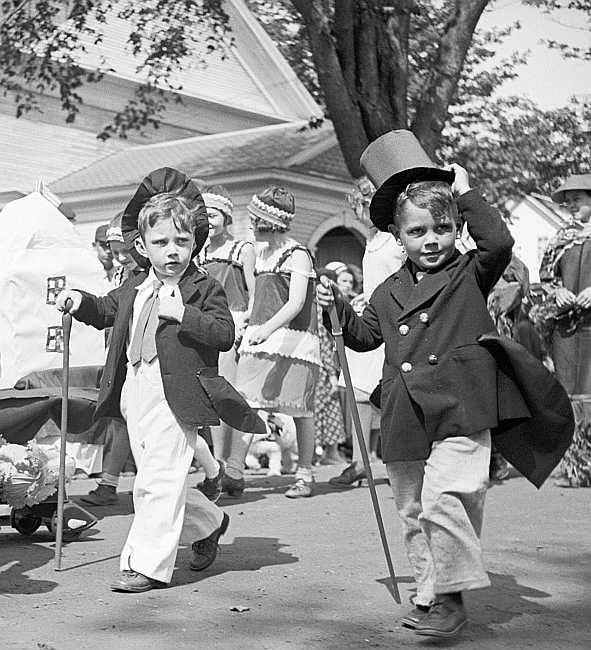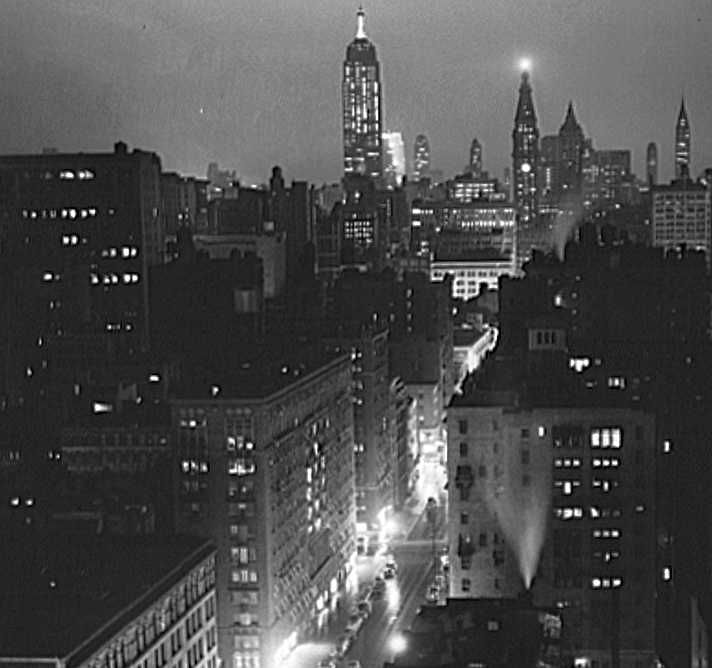
NORTH CAROLINA
Betty Stone
I was a case worker for the increasingly large numbers of young men and boys who rode the rails to New York.
Only a year out of women’s college, my first assignment was processing the hordes of unemployed seamen at the city’s port. It amused and touched me that they called me “Sir.” I suppose any authority figure was SIR.
Perhaps my bosses also found that inappropriate for I was soon transferred to Brace Newsboys’ Home, a privately endowed charitable shelter near Manhattan’s City Hall, then being funded by various government agencies.
There I and others like me, including my future husband, were called social workers and we did indeed take a course or two at the New York School of Social Work. It taught us to take and dictate long supposedly therapeutic intake interviews, something we soon found out we had no time for. Our important job was to write about the boy to his hometown social agency asking it to investigate his family situation.
Frequently the boys said they had left home because of a cruel stepmother and sure enough frequently the social agencies would write back saying that was true. Either they had a cruel stepmother or they came from Pennsylvania where the unemployment was total.
Simply to survive during the Depression in one Pennsylvania town, everyone including the mayor and chief of police belonged to a "Bootleggers Coal Miners Union."
While the mine owners looked the other way, the bootleggers pushed coal up out of the mines on pipe rails in what had previously served as express wagons and baby carriages.

Dorothy Hooper
In 1931, we settled on N E Market Street, Reidsville along a stretch of almost one mile of railroad tracks.
Many early mornings the neighbors could expect a knock on the back door soon after a train had gone by. The knocks were from hoboes – white and black. Sometimes they were called tramps. They wanted food and would do chores to show them their gratitude, such as stacking wood, splitting kindling and bringing in coal for fuel. Never was there any sign of theft or violence. No one had a lot of money but the opportunity to share was there and taken advantage of.
My Dad was a policeman and later became a plain clothes detective.
Sept 19, 1932(enclosed clipping)
Two youths broke into and looted the lunch stand of Paul Nimer on W. Market street early Saturday morning. Police officers John Pettigrew and John Durham were walking a beat along this street about 4 a.m. when they saw the youths, who were near the intersection of Morehead Street.
Both lads carried bundles.
They saw the officers and being considerably startled at thus suddenly coming abreast of the law, they ran.
One of them dropped his bundle. Officer Pettigrew ran about half a block and called for them to stop. They stopped.
They were from Danville VA and had hoboed to Reidsville on a southbound train.
Their two packages of loot contained a great variety of things.The two were ordered to keep out of this city.”
When a hobo died, when passing through town, the benevolent people and a caring mortician saw that he received a Christian burial.
Some hoboes were rail Robin Hoods. They were able to ride past the poorer homes and throw off pieces of coal from the boxcars. There was no problem for them to determine who was needy:
During the Depression no smoke billowed from the chimneys.
NORTH CAROLINA
Ernest Blevins
Rode rails from Fairfax, VA, 1940, age 15 -16 ½
I guess the worst person I remember was a grocer near the tracks in Mobile, Ala. He gave each of us two green bananas. He said that was all he had and that they would probably kill us. I guess he had his belly full of bums, being so close to the tracks. We laughed and ate the bananas.
Riding the rails through 18 states answered a lot of questions. Each day brought new sights to see, cities, factories, rivers, farm lands. We saw America was a land of opportunities even though we were in a Great Depression. There was an air of hope. The people were down, not out.
I have lived to see better days.
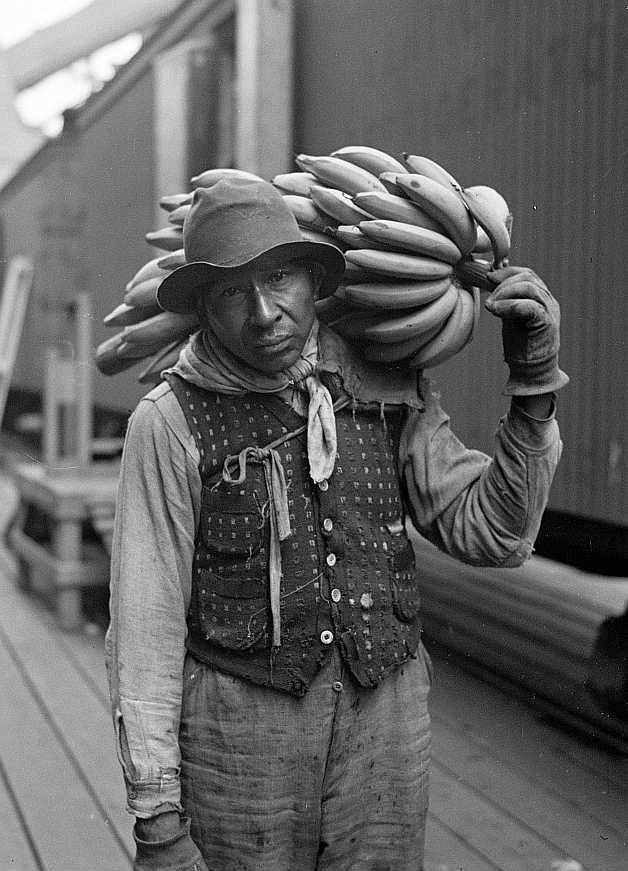
NORTH CAROLINA
Frank Dunn
1928, age 18
“We had no sleep for several nights and we were standing up in the middle of an empty boxcar which was moving at full speed. I fell asleep standing up and I started running. Fortunately I ran lengthwise instead of sidewise through the open door. I ran into the wall of the car and cut my face open. When we tried to get in the YMCA in Kansas City we were turned away by the clerk who said it appeared I had a contagious infection.”
NORTH CAROLINA
Howard “H.O.” White
14-year-old
Rode with two other boys, beginning in 1929
I was born on May 12, 1912 or 1915, I don’t know which.
He remembers growing into adolescence in Brannock, Nebraska which is near Lincoln. His family had moved from Greenleaf, Kansas where H. O. was born, to Brannock when he was four years old.
H.O. was the third of 11 children born to Mr. and Mrs. Phillip White. His father had pitched baseball for the Kansas Agqies a few years and left the game to farm and raise his family. His mother Cora was a singer from the Shelton-Laurel section of Tennessee near the N.C./Tenn. state line.
H.O.'s family fell on hard times during the Depression years. He remembered, “My father had to quit farming and took a job cutting meat because he was good at it. I was pretty big for my age and was able to hire out to other farmers in the area to help my family survive. Boy! Those were tough times. I can remember when we were eating corn meal mush (fried cornmeal) for breakfast, dinner and supper. My family was slowly starving to death."
“One day a friend named Bill said, 'let's get away from here. So about a week later we hoboed a train headed for Florida. That was in April or May and we were both 14 years old.
"In Florida we became migrant workers and picked citrus all around the state. We rode the trains and slept anywhere we could find shelter. Bill and I were hard workers and in a few months everybody in the business would hire us.
"We earned good money (about four cents a box) and sent a11 of it to our families except 50 cents we kept for our expenses. We’d buy a sack of Golden Grain smoking tobacco and that would last us a month.
"People called Golden Grain “Hoovers Oats" you know because he was President (President H. Hoover) when times got bad.
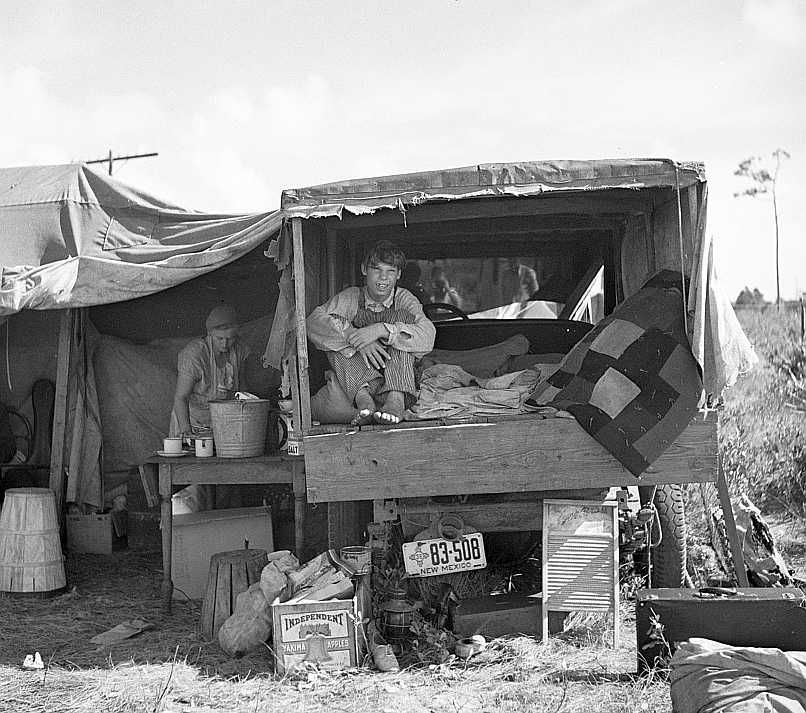
“Anyway when we finished the fruit season in Florida a man we worked for told us we were really good workers and said we ought to go to California."
Bil1 and I hoboed a west bound train and arrived in California a week or so later. We picked apples and grapes that season in the Yakima Valley. Working from daylight to dark we earned five to six dollars a day which was unheard of. Very few adults, let alone kids earned that kind of money during those years. One man told us we were the best workers he’d ever had. Bill and I were a good team.”
For five years H.O and Bill hoboed and picked fruit from coast to coast. During those five years the two had many experiences worth relating.
H. O. explained that he and Bill never were actual hobos who rode trains and looked for handouts but used the rails for transportation instead. Of course they were treated as hobos by railroad detectives who tried in vain to keep them off the trains.
"We had to leave a railroad car or missed a ride many times because of them,” said H.O. “One time in Ogden, Utah, two boys about our age got in the same boxcar Bill and I were riding in. We ate and stayed together for about two days before getting to De Ridder, La. where railroad detectives took 160 of us off the train. They searched us and split us from the other two boys.
Bill and I were ordered to work 30 days on a pea farm for having been on that train. When I asked a railroad man what happened to our buddies he said they weren’t boys, they were girls! They sure had Bill and me fooled.
At the migrant workers' camp we were given a typhoid shot and a new pair of shoes. Next morning we were roused by a new crowd coming in and Bill and I were ordered out to make room for them. We were driven 15 miles out of town, released and told to stay off the trains. We had spent one night at the camp, got shots, new shoes and were released because they were taking so many people off the trains they just
didn’t have enough room or work for them all."
H. O. and Bill walked about ten miles before jumping another train to New Orleans.
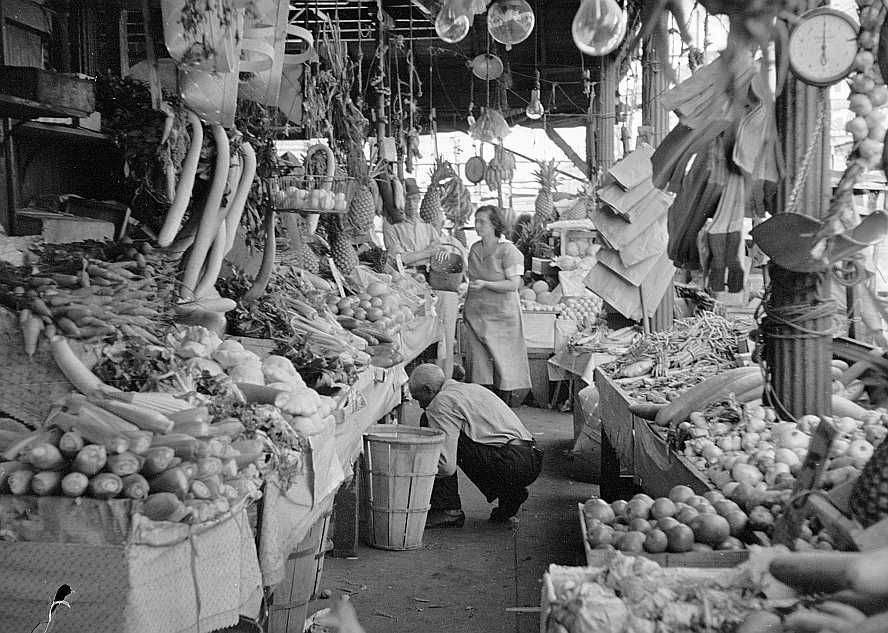
Near that city H.O. heard the noise and saw several camp fires of a hobo jungle. He and Bill would camp alone on a rise away from the camp like they always did. Next morning H.O. was awakened by sirens in the main camp where two people had been killed.
"That was a regular thing," said H. O. “that’s why we always avoided the camps. In the larger ones, at least one or more people got killed every day in them."
H.O. and Bill decided to leave and caught a train late Sunday night headed east for Florida.
H. O. said, "We found a reefer (refrigerated) car and decided to get in the empty ice compartments on each top end. I got in mine and used a small stick we always carried to wedge the door above open. I remember sleeping and waking up several times, and feeling awful bad. The stick had fell and allowed the hatch door to close shut. I remember trying to open it, not having the strength to, falling back to sleep.
Next thing I knew someone in white was pouring hot broth in my mouth. I had no feeling in my leg and my first thought was I'd lost it in a train accident. I couldn't remember much and couldn't talk. Later I became coherent but still couldn’t talk. (Chicago Railroad yard workers had found him in the reefer unconscious and put him in a railroad cafe back bedroom.)
H.O. was suffering from starvation and dehydration. He possibly suffered from toxic residue fumes frequently left in reefers.
Finally this guy brought me pencil and paper and told me to write. I wrote, Is my leg cut off?' He said, 'no.'
I wrote, Where's my buddy?'
The man said I was the only one in the boxcar. I wrote explaining how Bill and I had got in that car in New Orleans on Sunday night. They told me it was now Saturday and I was in Chicago. I couldn't believe that I’d been in a semi-conscious state for six days.
As soon as I could talk I called Bill’s family and told them what had happened. Later railroad officials and private detectives hired by Bill’s family would search the rails but no trace of Bill was ever found.
After much thought I am convinced that Bill never got in the reefer that night. Something happened, he may have slipped or fell off that car. If so he would have ended up in the alligator infested swamp east of New Orleans. The railroad runs through it from time you leave New Orleans all the way to Florida. I think that is what happened."
After his recovery railroad agents give H.O. a train pass for any destination he chose and he left Chicago headed home to Nebraska after working at the cafe long enough to pay for his keep and stay there.
“I didn't like riding the cushions (passenger train) so I got off and hoboed a freight. I just enjoyed the open, unconfined nature of a freight train,” he said.
After a couple of days visiting family he’d not seen for five years H.O. was restless again.
“I’d never been to New York so I decided to go there. I caught a freight and was gone again.
Lifetime career in North Carolina highway patrol.
NORTH CAROLINA
Markle Pulley
1931-1934
Age 20 - 23
1932, I was looking at the beautiful Queen Mission at Santa Barbara, CA and this guy asked me if I would like to have a meal in the mission. I said yes and he made a deal with the monks to sweep the walkways. When we went inside we were led to a small room that contained a huge table and benches. I remember green peas and some kind of meat and thick slices of bread on my plate. That redwood table and thick walls were something I will never forget.
I traveled the UP across Nevada and Utah in daylight and saw many mirages. One of a lake with a canoe pulled up on the sand. Some had a few trees and other looked like bunches of bushes.
I tried to get a picture of the bridge across the Royal Gorge on the Arkansas River. The engineer was blowing his whistle to hear the echo bounce wall to wall and going so fast I missed the bridge.
I was in the Seaboard yards at Richmond VA. Two police were coming toward me and yelled for everyone to stop. Two black boys kept walking to where I stopped. When the police caught up with one of the blacks, he hit him on the side of his head with his fist and knocked him down. They didn’t speak to me. That assault was uncalled for.
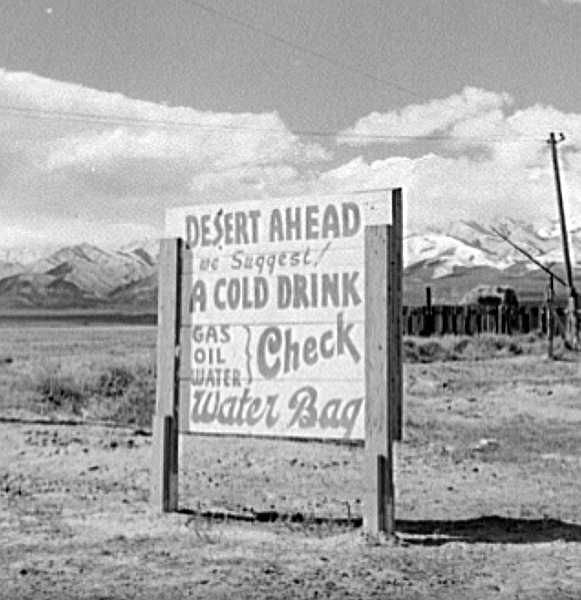
NORTH CAROLINA
Thomas Picklesimer
Rode from 1927 -- 1939
“I saw my best buddy’s head cut off when he missed ladder and went under the box car.”
“I saw a cop hit a man with a black jack and all of his brains fell on the rails.
“I knocked a brakeman off the top of a box car while the train was going fast, because he tried to hit me with a black jack. I don’t know if it killed him, for I rode all night.”
NORTH CAROLINA
William Aldridge
Just out of high school, I could not afford college. Went looking for a job. Thought the land of opportunity lay beyond our isolated mountain village.
At the height of the Great Depression I found professional men begging on the docks of New Orleans. I left home with twenty-five cents in my pocket and put my last nickel in the ferry slot in New Orleans and headed west. I had a brother in San Francisco and this prompted me to go in this direction.
Once I knocked on a door and a very pretty girl came to the door. I just asked for a glass of water which she brought me. Most folks were kind and sympathetic, but some slammed the door in my face.
The only shelter I ever had was the Salvation Army. They housed me in Dallas, E1 Paso, and Needles, California. They gave me a bath, a robe to wear while I washed my clothes, which I scrubbed out by hand. They gave me a hot bowl of gruel for breakfast and a bowl of soup or stew for supper. It was manna from heaven.
Learning the ropes came by a determination for survival, which is a good teacher. I suppose instinct taught me how to catch a boxcar. Instinct kept me from moving when I sensed danger.
In Hemstead, in west Texas a lady asked me to hold her baby while she caught the train. She held out the baby and I took it in my arms before I realized what she was asking. She caught the car in front of me and you better believe that I caught the next one with one hand while holding the little baby with the other. I handed the baby over to the happy mother and wondered what I could have done had I not caught the same train.
The best person I met was a brakeman who tossed a quarter to me, this was in southern California. He said, "Hey, kid, go get a meal". I did just that, and it was the best meal I ever ate. This was a whole loaf of French bread with beans and spices in it.
The bad was also connected with the railroad. A railroad Bull kicked me off 20 miles west of Houston, Texas at a water tank. This was around midnight and the terrain was unbelievably rough and alien to me. I walked that 20 miles that night nursing my bleeding fingers where the "Bull" had stomped them.
My shoes lost what soles that I had left and I found some wire under a bridge to wire them back on. This was not too pleasant walking with wire wrapped around my feet. Again, in Hemstead, Texas the Salvation Army came to my rescue and gave me a pair of shoes.
Like many migrant workers, I had nothing but disappointment for over a year. I went on up the coast to Washington. I got a job cutting cedar shingle bolts. I got $17.00 for two months work along with board and room. I considered myself lucky. I did not want to be in the state of Washington and headed back down the coast to California. I took a passenger boat that hauled passengers from Los Angles to Portland. I was 3rd. class, right in the bow and sick all the way. I found work in San Francisco with Owens-Illinois Glass, mixing sand to make glass.
Everyone out there had a common goal. To survive. With hope that somewhere along the rails would be the golden opportunity. Probably some were making a career of riding the rails, but most of us were looking for a better life.
I saw one man get his legs cut off. He caught the rear end of the car and missed, falling between the cars. I learned early to catch the front end of the car This tragic accident is vivid to me to this day.
I guess we didn't feel much like singing. There were a lot of train songs at that time. Will Rogers was quoted often - of his Indian heritage, he was supposed to have said that his ancestors met the people that came to Plymouth Rock.
I guess that I never truly gave up the idea that somewhere down the road would miraculously appear the great opportunity of my life. That a wonderful job would be offered, with food, clothing, housing and perhaps even an automobile. Dreams are great, but that’s about all they are. Just dreams.
My wanderings did not encompass the greater events of that era. I remember Hooverville in Seattle which had a population of 5000. Hooverville even had its own mayor. This "town" was located on the rubble dump. The residents of Hooverville would put the Grapes of Wrath to shame.
I found permanent employment with Owens-Illinois Glass in Oakland, California. I had to work two years before an apprenticeship was open for a machinist. The first year I got $.25 (cents) per hour. The second year 30c, the third year 35c, the fourth year I got promoted and received $5.00 per day which seemed a lot of money at $25.00 per week. So much so, that I felt I could get married.
I suppose I was a happy-go-lucky kind of guy and the other guys called me "Sunshine." Later on I became "Carolina" being from the state of North Carolina.
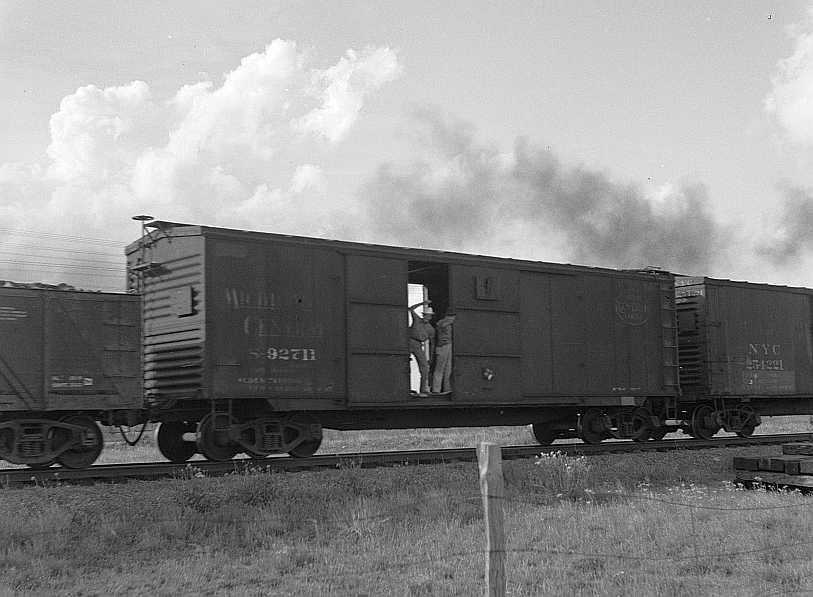
NORTH DAKOTA
Carl Larsen
In the year 1934 dust clouds formed very often. The fields had been planted. And many seeds did not sprout due to lack of rain. Grasshoppers were in abundance. There were W.P.A. projects – building dams, roads, and outdoor privies, etc. There were N.Y.A projects – working in the schools, sewing projects etc. but there weren’t enough jobs for all those without employment. The summer and fall looked bleak, not only for those who had families to provide for, but the young people who needed to earn a living.
Four young friends decided to ride freights looking for work. From rural homes near Epping…
Carl had courage to tell the group in the car not to be rowdy as there was a girl aboard. One man got rowdy so Carl grabbed him by the collar and boosted him out of the door. Girls or women were not supposed to be in the boxcars at night so the group decided to cover for her.
She was traveling with her two brothers, and they wanted to keep traveling together. If she had to get off, then the brothers had to get off too.
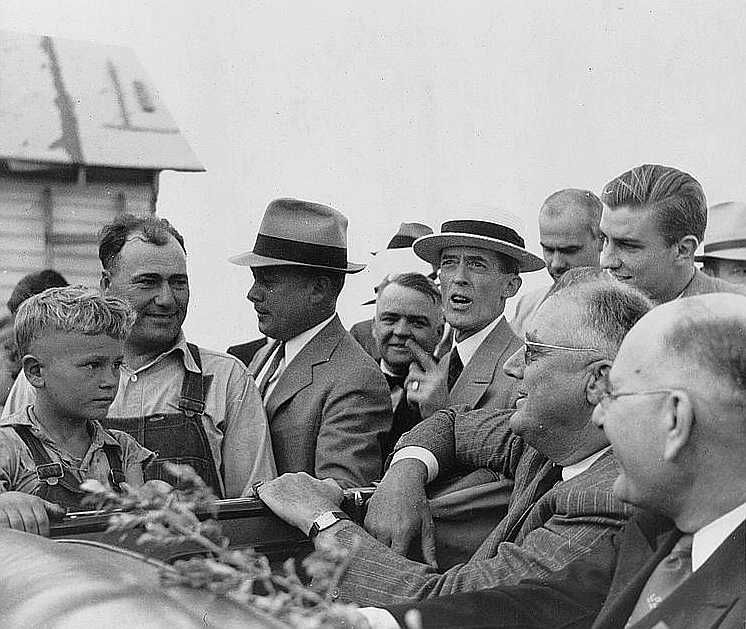
NORTH DAKOTA
Edwin Olsen
Montana is a long state and it is called the big sky country. When we headed across Montana there were no empty cars or open cars or reefers or anything else. There were only the catwalks on top of the box cars. This then is where we rode.
When night came and it was time to sleep we decided that one would sleep and the other would put a scissors grip on him with his legs. Then after a while we would trade places.
I took the first shift and held him on. As I held him on, looking at that big, big sky overhead several things came to mind.
One was that riding the rails could get in a person’s blood. That the life was free from so many of the restrictions that is a normal part of life. Also that some day I wanted to have a nice home and a nice wife to share my life. The way to do this was go back to school.
My friend took the next shift and when I awoke he was sleeping. What kept us from falling off I have no idea but perhaps the swaying motion of the trains became such a part of us that we stayed on.
NORTH DAKOTA
Myron Overland
19-21
CCC /no money to get home to visit folks
rode rails 1940-42
I was kicked off a boxcar in Minot ND and this was seen from the window of a rail coach. Man felt sorry for me and invited me into the train, paid my ticket to my destination and invited me to eat with him in the diner. We had fresh poached salmon and it was delicious. Never told me his name. Just a nice old gentleman.
NEBRASKA
Bud Hughes
graduated from school in 1936
“… jobs were few and far between, in fact it was a standard remark of the times, “How come you are still in school, can’t you find a job?”
*Went to seek work in hay fields of Eastern Colorado. Got work but couldn’t survive on wages of dollar a day. Went to Denver, where only job to be had was 'pearl diving'…
At Brush, Colorado on way home, they were arrested…
Sitting across from the Marshall I was answering his questions, and with nothing to hide was being truthful. Suddenly, without warning, he reached across and slapped me across the head so hard my ears rang and tears came into my eyes. “Don’t lie to me you little SOB, he yelled.
We later learned that there was a carnival in town the previous night and some stores had been robbed.
To add to our misery, when we got back to the bridge, the clothes we left drying were missing.
NEBRASKA
John McKinney
Father was a railroad engineer on the Erie Railroad. Hometown was Port Jervis, NY.
I was of high school age. On many occasions Dad would hide hobos in the coal tender behind the engine and Mom usually had an extra sandwich and piece of cake tucked away in his lunch pail to feed a hungry man. Dad knew where the bulls hung out and would tell the hoboes where to leave the train and where to rejoin another.
One cold wintry day Dad came home from a run bringing a very cold and hungry young man with him, a fellow of about 25 who claimed to be from Wyoming. He was extremely polite and addressed mother as ma'am. His western drawl placed credence to his story. The folks were not in habit of admitting hoboes to the house, usually fed them on the back porch and only when dad was at home.
As they ate supper the young man said that he was not a regular hobo and was only trying to get to Long Island, NY. He claimed that an uncle there had recently died and that he would share an inheritance. After a hearty meal and the “loan” of an old overcoat and gloves our guest departed with instructions as to where and when to catch the next eastbound freight.
In mid-May a taxi pulled up in front of our house and a polished young man in a new suit came to the front door. Mother answered the door and would not have recognized the corner except for his western accent.
With cab waiting he refused to enter the house but explained that he had come into several thousand dollars and was on his way home retracing the route he had taken eastward and he had vowed to stop at every location where he had received a helping hand to thank his benefactors.
We never knew the man’s name, nor did we hear from him again.
NEBRASKA
Lucille J
I was only 12 years old going on 13 when Mom decided to leave Dad in Scottsbluff, Nebraska. We were practically starving.
I was nearly raped in the stockyards at Lincoln, Nebraska.
Went many times to houses along the way begging food. Ate raw potatoes when some of the other hobos would jump out and get them.
My hair was long and unkempt. Very sunburned.
At one time we were in a box car Mom, my brother and I – a railroad bull jumped in, pulled a gun and pointed it at all of us and ordered us to jump. Which we all did, the train still moving, and walked the remaining miles to town
NEW HAMPSHIRE
Frank Corbin
b 1915
started riding at 18
rode 1933 to 1937
Our garden (my main chore) was in tip top shape and no job (even on the farms) was available. Men were competing for any means of earning a dollar. I was always curious as to what was on the other side of the hill. Made a trial trip from St. Johnsbury VT to beyond Baltimore. Spent all of my earnings, $2.40, over four months.
Having been raised around farms in New England, I learned a lot of make do. Would do most any kind of home chores for a meal or a few days benefits. Learned to sleep in abandoned buildings, culverts, under haystacks or sneak into a barn after dark. The meals were not always table d’hote, but the variety was there. Even acquired some surplus army blankets one time when they retired the horses.
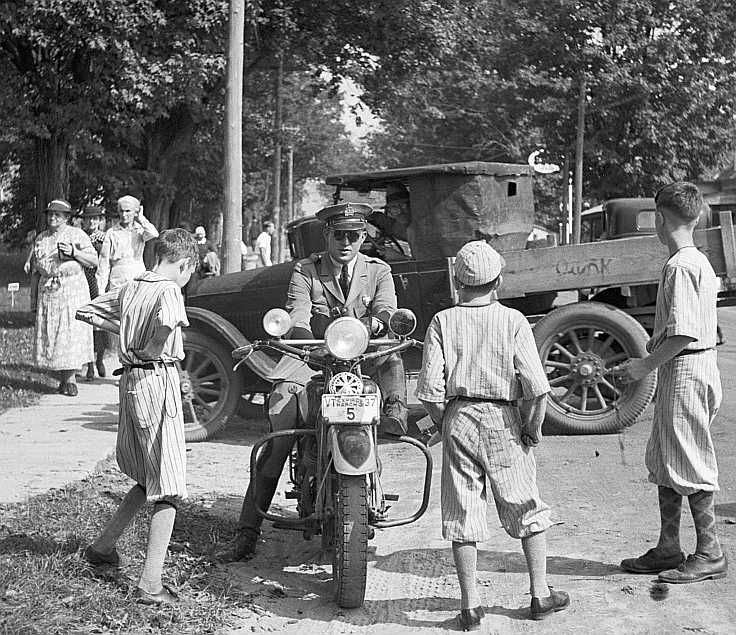
Learned by keeping my mouth closed at the right time and my ears and eyes open. I was willing to try anything that worked for the other fellows. I was very handy at preparing a meal from anything available, so seemed as though everyone was glad to teach me a trick or two.
One thing I will never forget: the sight of bloody feet by the track as we slowed onto a siding in a western town.
Some poor bo went to sleep after getting into position for a long haul riding the rods. The jerking of the train as it started up caused him to release his grip under the box. As he rolled along under the moving train his feet went on the rails and were severed by the wheels.
Most of one year I had a small African-American man older than myself as a partner. He had been a jockey in the past, a great banjo picker.
No one else that I joined up with was very buddy buddy as to very intimate confidences. Most had a nickname because of appearance etc. No one seemed to want to admit of a true name or former life.
A big sloppy fat man staggered into camp as we were preparing the evening meal. He grabbed a half loaf of bread and a couple of tin cans. Mumbling to himself and offering anyone interested a drink, he tore open his brown paper package and out tumbled several small cans (canned heat), half-cup sized tins filled with a wax like sponge and impregnated with deliberately poisoned alcohol (wood alky). This would burn like a candle, giving off a comparatively hot flame often used by the army in emergency cooking.
He strained the alky through the bread, theoretically removing the poison, added water to make it palatable, then passed it around. He drank with those that did and those who didn’t until it was all gone, then joined us in a meal of jungle stew, overstuffed himself and went off to sleep by the fireside. Next morning he was dead.
Often met at the lot line by a big ugly dog hackles raised and growling. Usually fastened to his house or a post by a chain, fortunately.
Often met at the door by a scraggly-looking lady shouting “Git out of here you dirty bum, you’ve been here before.”
On the other hand some people apologized for not being able to help, then offered a glass of water while telling me I should rest on the porch. Then they brought out a plate loaded with good plain food. Not an unhappy disappointment.
A friend with whom I had been traveling and I got a job in the wheat harvest. I was in the cook shack, he was feeding the thresher. Just before noon of our eight day he was brought in, laid out in the bed of pickup truck. Both hands and arms mangled and covered with blood. Fortunately he had passed out from the pain and a bump on the head.
His fork had caught in the machinery and he would not let go. Any tools you lost or broke were subtracted from your pay. Someone else stopped the machine. He was taken to hospital 95 miles away. Never heard of again.
As I originated in Vermont and liked to sing I soon became known as the Green Mt. Balladeer. I learned many songs, especially the story type, was always pretty good at learning and remembering poetry, so the same for songs. Not the best voice but once you get the gang interested, just plain talking stories, kept up a big part of the night.
Met some of the Dust Bowl migrants when going to a warmer clime one year. It made me sick to see the condition of the younger children. Some of the parents were forced to steal, not for themselves but to save the young uns.
Met a fellow in NY city, a sailor about my age who had run out of money and was going back to sea. He was a Canadian and convinced that I, with my Canadian birth certificate could get by as the same, and surely I could get on as a mess boy. As we had not yet entered war our American ships were sort of loafing and foreign ships were going full blast. I finally signed on a Greek ship as a Canadian and mess boy.
NEW HAMPSHIRE
Joseph Cornett
18
1930-31
I went to California to pick up the gold dollars that roll in the streets. I found out this was not true and that getting work was very difficult.
A friend of mine had his legs cut off in Toledo Ohio while sleeping under a box car.
When I was in Oklahoma if I fell off a train and got killed no one would’ve thought much of it. Twelve years later the government was spending thousands of dollars to make me a better killer at the Fort Sill school for officers for the US army.
NEW HAMPSHIRE
Reg Maisey
Two kids, 16 and 19, a friendship that has lasted to this day. + Virgil Thomsen
“We were rolled about as though peas in a drum."
It seemed everybody and his dog were on the move.
Salt Lake City wonder was not the Mormon Tabernacle Choir but self-service restaurant with a conveyer belt.
“Some time during the night we crossed the Continental Divide at Tennessee Pass. I crawled topside to witness extra locomotives pulling and pushing train over the hump/ All I could see was the steam from the engines and sparks shooting out from drive wheels.”
Saw a group of bos pelting lumps of coal on a bull as we pulled out of yard. Was told of bulls being hung by the heels between boxcars in Keokuk.
NEW HAMPSHIRE
Virgil Thomsen
“The delicious feeling of lassitude and warmth that crept over us after a good meal was nearly overwhelming. Now we had to sleep, but where? Out in the night again, we wandered up town and soon found ourselves on a great expanse of lawn, bordered with shrubs and bushes. We hauled out a blanket, smoothed it out under a sprawling bush and in a few seconds were in a restless, uncomfortable sleep.
At seven we were awakened by daylight and buzzing insects. George dragged himself up groaning and cursing. Packing up the blanket, we glanced about and saw that we had napped on Utah State Property, the well groomed grounds of the State Capitol.
One of the highlights of our stay in Salt Lake City was the discovery of a high-quality self-service restaurant. This establishment was unique in that it employed no waiters, bus-boys, or dining room personnel. So far as I could see there were only cooks and dish-washers. Also unique was its advertising slogan “All you can eat for 50 cents”.
All the food was delivered to the diners on a long conveyor belt running the full length of the dining room. The patrons sat on stools on each side of the conveyor and were free to select any of the various dishes as they arrived from the kitchen. Empty dishes were returned on the same conveyor.
